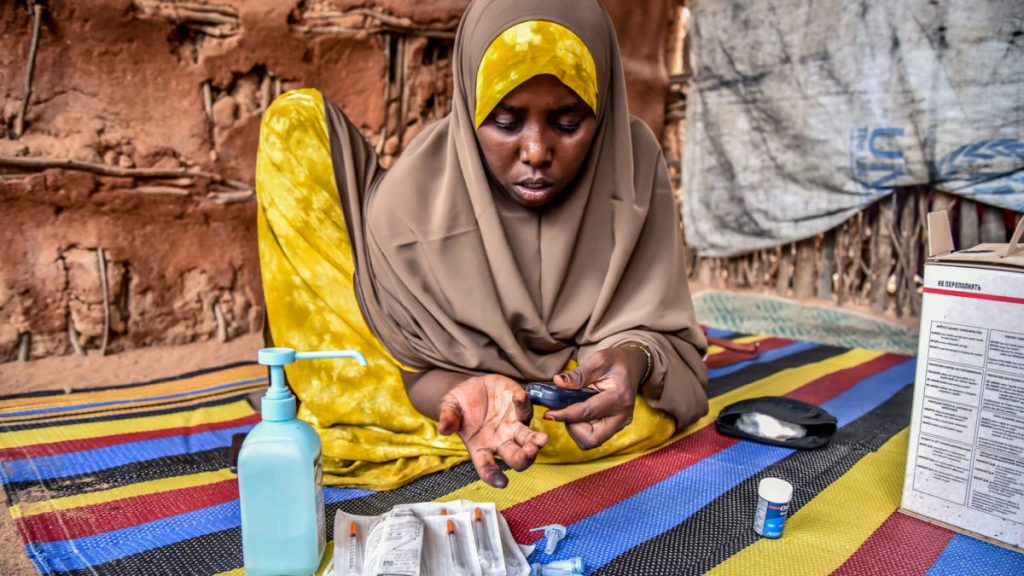NAIROBI, Kenya — Managing diabetes, a preexisting condition that requires a daily insulin injection, just got easier.
Insulin can now be stored in temperatures ranging from 25 degrees Celsius (77 degrees Fahrenheit) to 37 degrees Celsius (98.6 degrees Fahrenheit) for four weeks.
That’s the finding of a joint study by Médecins Sans Frontières /Doctors Without Borders (MSF) and the University of Geneva published in PLOS ONE, which is especially important for those living in resource-poor settings without refrigeration.
“For far too long, we were unable to send people with diabetes back to their homes with insulin, due to its cold-storage requirements. Some of these people travel long distances daily, while others relocate near the clinics to have access to insulin injections,” said Dr. Philippa Boulle, Non-Communicable Diseases Advisor and leader of the chronic diseases group for MSF.
“With this new finding of no refrigeration requirement in a climate of up to 37 degrees, and with a well-developed patient education and support program, people with diabetes in resource-limited and humanitarian settings will now be able to inject themselves in their homes, significantly improving the disruption to their lives from having to attend hospital for twice-daily injections,” said Boulle.

In her 22-year journey into and out of the camp, Qamar Ismail Yussuf paints a picture of what many Somali refugees have to endure to pursue healthcare services. She first came to Dagahaley in 2009 with her mother and seven siblings, mainly to seek education and health services in the Dadaab refugee camp in Kenya.
“UNHCR did not register us as refugees, so life in the camp became a little challenging, though it was a lot safer than in Somalia,” said Yussuf.
Her father had stayed in Somalia to look after his business, but in 2011 he fell sick, and Yussuf’s mother returned to look after him, taking five of her children with her, including Qamar. Back in Somalia, Yussuf started feeling unusually thirsty, as well as feverish and nauseous.
“I would feel thirsty a lot and go to the restroom frequently,” she said. “We went to the local pharmacy, and they gave me some intravenous fluids, but nothing changed. I would faint a lot, and my family started saying I was possessed. Some of my relatives requested that I should be brought to Dagahaley in Dadaab Refugee Camp, where I was diagnosed with diabetes.”
Yussuf was unconsciousness when she was brought to MSF’s hospital in Dagahaley in 2017. She was admitted to the hospital for seven days, while her blood sugar levels were monitored.
“I felt a huge relief when I was put on treatment,” she said. “After being discharged, I had to go to the emergency room every morning and evening to get insulin injections. It didn’t take long before we were trained and given a portable cooling box. Going to the ER, leaving my young children at home was difficult. Now I am OK, and nobody even knows that I have diabetes.”
“After I got this, it’s like I gained independence,” Yussuf said. “I can inject any time I feel like my sugars are high. Many people are injecting, and it’s something that people have come to understand. I carry my syringes and portable cool box whenever I go visiting my friends or relatives. I never leave them behind.”
“The ability to self-inject insulin is a fundamental aspect of diabetes self-management and the power of people with diabetes to be empowered for their health,” said Boulle.
MSF provides all the supplies Yussuf needs, including insulin and syringes. She has follow-up visits at the hospital every 14 days, when she collects more supplies. She has not faced any stigma since she started taking insulin, compared to what she faced before her diagnosis.
Diabetes is a chronic, progressive disease that can be controlled with effective treatment. However, in many countries, people living with diabetes do not get the treatment they need to stay healthy and alive. Only about half of people requiring insulin have access to it, according to Stanford Medicine and MSF. Access to insulin has been primarily prevented due to high prices, challenging storage requirements and complex treatment protocols.

Strict storage recommendations for insulin are difficult to follow in tropical regions and even more challenging in conflict zones and humanitarian emergency settings, adding an extra burden for managing diabetes. Storage recommendations for insulin require refrigeration until its expiration date, or until it is opened. Once in use, the storage recommendations on the label of most human insulin is below 25 °C for 42 days. In many settings, this results in people being asked to travel to the health clinic for injections and being monitoring, at least twice a day, for life.
Every morning, Yussuf checks her fasting blood sugar before eating or injecting insulin.
“I can read and understand the glucometer well and know how much insulin to inject,” she said.” I am prepared for the injections, so they never bother me.”
MSF works in more than 70 countries worldwide and reports that insulin is often unavailable in public-health facilities or private pharmacies in many of these settings.
MSF has been engaged in providing treatment for diabetes in various countries, including Jordan, Lebanon, Iraq, Syria, South Sudan, Democratic Republic of Congo, Tanzania, Kenya, Zimbabwe and Bangladesh, to people living in resource-limited and humanitarian settings.
(Edited by Fern Siegel and Carlin Becker)
The post Storing Insulin Without Refrigeration Saves Lives In Refugee Camps, Poor Countries appeared first on Zenger News.


